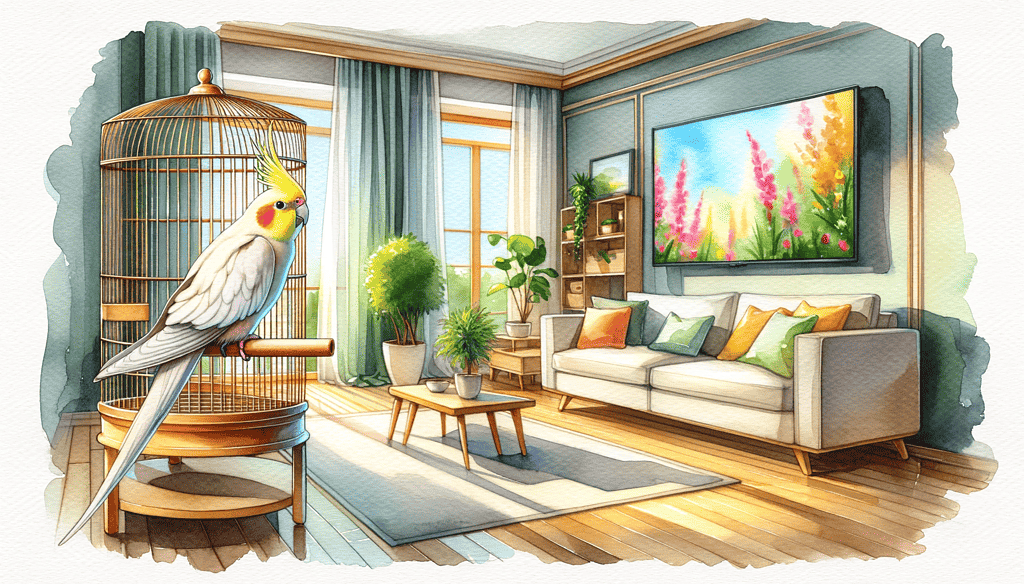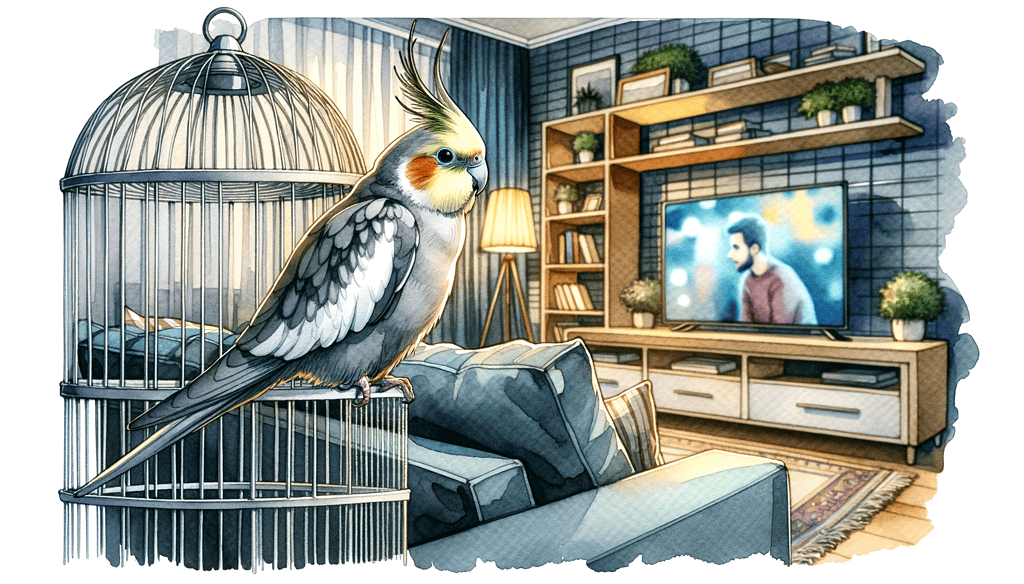
Cockatiels, with their vibrant personalities and curious nature, often surprise us with their unique behaviors. But have you ever wondered if these feathered companions enjoy the same entertainment as we do, like watching TV?
As a general rule, cockatiels can indeed find enjoyment in watching television. The movement, brightness, and sounds from the TV captivate their attention, providing them with both entertainment and a sense of companionship.
But how does this modern pastime affect their well-being? Dive in as we explore the world of cockatiels and their relationship with the television screen.
What Makes TV Enjoyable for Cockatiels?
Before we delve deeper into the specifics, let’s debunk a common myth: Birds, especially cockatiels, can indeed watch and understand TV to a certain extent. It’s not just a blur of moving colors for them. They do enjoy watching TV. But why? What is it about the television that captures their attention?
- Relief from Boredom: Just like humans, cockatiels can get bored. TV acts as a source of entertainment, breaking the monotony of their day.
- Keeping Them Occupied and Preventing Loneliness: I’ve noticed that solo cockatiels often feel lonely. TV can act as a companion, keeping them engaged and lessening feelings of isolation.
- Observing Behavioral Patterns of Their Kind: Nature documentaries or videos featuring birds can be particularly interesting for cockatiels. It’s like them watching their own kind, understanding behaviors, and sometimes even trying to interact.
- Attraction to Movement and Brightness: Just like us, cockatiels are drawn to the vibrant colors and constant movement on the screen. Their keen eyesight, evolved to spot tiny movements in the wild, finds the ever-changing scenes on TV intriguing.
- Social Nature of Cockatiels: These birds are inherently social creatures. In the wild, they thrive in flocks, always seeking interaction. The characters and sounds from the TV can sometimes act as a pseudo-flock, giving them a sense of belonging.
- Sense of Comfort and Security: For some cockatiels, watching TV can be a comforting routine. The familiar sounds and sights can provide a sense of security, especially when they’re alone.
Benefits of Letting Cockatiels Watch TV
- Provides Mental Stimulation: Just as puzzles and toys stimulate a bird’s mind, the diverse content on TV can challenge and engage their cognitive faculties.
- Source of Companionship: Especially for cockatiels who spend long hours alone, TV can act as a companion, ensuring they don’t feel isolated.
- Opportunity for Learning and Mimicking: Cockatiels are known for their ability to mimic sounds. TV, with its plethora of sounds and dialogues, can be an excellent tool for them to pick up new tunes and words.
- Visual and Auditory Stimulation: TV offers a dynamic visual and auditory experience. The rapid scene changes, varying sound levels, and diverse content can be both stimulating and engaging for cockatiels.
Potential Risks and Precautions
- Firstly, the bright lights from the television screen can potentially disturb a bird’s natural sleep cycle. Just as we need our dark and quiet environment for a restful night, cockatiels too require a certain ambiance to get their beauty sleep. The constant flicker and glow from the TV might not be conducive to that.
- Secondly, there’s a fascinating aspect to consider. If a cockatiel is left alone in front of a TV for extended periods, it might start to perceive the images on the screen as real birds or other entities. This can lead to them becoming stressed or agitated, thinking they’re seeing actual birds, especially if the content is of predatory birds or depicts scenarios that can be perceived as threats.
- Continuous exposure can overwhelm a cockatiel, leading to stress. Further, loud noises, sudden scene changes, or predatory scenes can scare them.
To ensure a safe TV watching experience for your bird, always monitor their reactions and choose content that’s soothing and appropriate for them.
Setting Up the Perfect TV Time for Your Cockatiel

As we delve deeper into the world of cockatiels and their relationship with television, it’s essential to ensure that their TV time is both enjoyable and safe. Let’s explore how you can set up the perfect TV environment for your feathered friend.
1. Choosing the Right Content
Selecting the right content is paramount. Just as we have preferences, cockatiels too have their likes and dislikes when it comes to TV shows.
- Nature Documentaries and Bird Songs: These can be particularly engaging for cockatiels. The familiar sounds and sights of other birds can be both comforting and stimulating.
- Avoiding Loud or Frightening Content: It’s crucial to steer clear of content with sudden loud noises or visuals that might startle or stress your bird. Remember, their well-being is paramount.
2. Setting Up the Environment
The environment plays a pivotal role in ensuring your cockatiel’s safety and enjoyment during their TV time.
- Safe Distance from the Screen: Ensure that the birdcage is placed at a distance where your cockatiel can view the screen without straining its eyes. This also reduces the risk of any radiation exposure.
- Volume Levels: Cockatiels have sensitive hearing. Always keep the volume at a level that’s comfortable for them. If your bird seems agitated, it might be a good idea to reduce the volume.
- Monitoring Duration: Just like us, cockatiels need a break from screen time. Regular intervals and ensuring they aren’t watching TV for prolonged periods is essential. From my experience, short sessions spread throughout the day work best.
Positioning the Birdcage: Is Near the TV Safe?
Safety first! While your cockatiel might enjoy its TV time, it’s crucial to ensure that its health isn’t compromised.
- Potential Harm from Intense Light and Radiation: Televisions emit a certain amount of radiation. While minimal, it’s always best to keep the birdcage at a safe distance to reduce any potential risks.
- Thinner Skulls and Radiation: Birds, especially cockatiels, have thinner skulls compared to other animals. This makes them more susceptible to radiation. Always ensure that the cage is positioned in a way that minimizes this exposure.
I’ve always advocated for a balanced approach. While TV can be a source of entertainment and stimulation for cockatiels, their safety and well-being should always be the top priority.
Conclusion
Understanding our feathered friends’ needs is paramount. In the modern world, where technology is omnipresent, it’s essential to strike a balance between natural behavior and the comforts of modern living. While TV can offer entertainment, it’s crucial to ensure it doesn’t negatively impact their well-being. I’ve seen many bird owners successfully integrate TV time into their cockatiels’ routines, but it’s always done with mindfulness and observation. Every bird is unique, and what works for one might not work for another.
I’d love to hear about your experiences. How does your cockatiel react to the TV? Do you have any special shows or routines? Share your stories in the comments below, and if you found this article helpful, please share it with other bird enthusiasts!
Frequently Asked Questions
Do cockatiels get bored easily?
Yes, cockatiels, being intelligent and curious creatures, can get bored if not provided with adequate stimulation.
How can you tell if your cockatiel is stressed?
Signs of stress in a cockatiel include excessive feather plucking, changes in vocalization, aggressive behavior, and a lack of appetite.
Are there specific TV channels or shows for birds?
Yes, there are specific channels and shows designed for birds, often featuring nature documentaries, bird songs, and other bird-friendly content.
